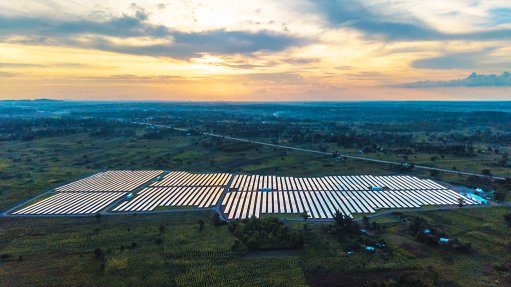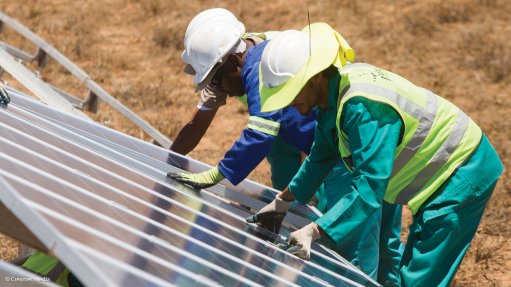Research chairs initiative beginning to help generate knowledge
The Department of Science and Technology (DST) is very happy with the success of the South African Research Chairs Initiative (SARChI), reports DST director-general Dr Phil Mjwara. He was speaking following the recent announcement by Deputy President Kgalema Motlanthe of the establishment of 54 new research chairs. This move followed the creation, in February, of new Centres of Excellence in the country.
“These instruments – research chairs and Centres of Excellence – are instruments that are really beginning to help us in our knowledge generation,” says Mjwara, “which we see as the backdrop for everything we want to do in the [national] science system”. The recent announcement takes the number of chairs created under SARChI to 157, although not all have yet been filled, meaning that the number actually functioning at the moment is about 150.
The DST’s objective is to create 200 of these research chairs. This target figure could be reached through the creation of visiting chairs and/or through the creation of more joint international chairs, cofinanced by international partners. Currently there is a joint research chair with Switzerland. The creation of a second such joint chair is being discussed with Germany. “International partners are excited at the idea of researchers spending six months in South Africa and six months abroad,” he states. “But this is a work in progress.” The DST wants to position South Africa as a preferred research destination.
SARChI is overseen by the National Research Foundation (NRF). Although the NRF’s budget is much smaller than that of the Department of Higher Education, it is succeeding in making an impact on research at universities.
There are two tiers in SARChI. Tier 1 allocates chairs as the result of an open process and is based solely on excellence. Tier 2 comprises “developmental research chairs”. It is aimed at institutions that previously were not strong in research, as well as at “emerging researchers”, who already have master’s and doctoral degrees but are just starting their careers. Under Tier 2, people with potential are identified and supported. After a few years, if they meet certain criteria, they could be promoted to Tier 1 status.
The new research chairs cover research concerned with astronomy, education, health, rural development and food security and land reform. So reported NRF deputy CEO: research and innovation support and advancement Dr Gansen Pillay at their launch.
One chair has been allocated to the astronomy-related sciences, to further boost South Africa’s Square Kilometre Array (SKA) programme (which is part of the larger, international SKA project). This takes to ten the number of SKA-related SARChI chairs.
Four new education-related chairs have been created, taking the total to seven. Some of the new chairs will examine the challenges facing the country’s higher education system. Most of he existing chairs are concerned with primary and secondary education.
Health gets 13 new chairs, doubling the total to 26. The new chairs are focused strongly on drug discovery and diagnostics (in part, in support of the recently unveiled Bioeconomy Strategy), as well as health policy and rural health development.
Rural development, food security and land reform are the concern of five of the new chairs. They take the total in this field to eight.
“While it is important to steer SARChI research programmes towards national priorities and strategies, it is equally important to provide the opportunity for researchers to pursue research that may not have immediate application or fall outside the directed and thematic areas,” he said. “To this end, nine research chairs from the new cohort were awarded in the open category.”
The NRF received 406 submissions from 22 universities in response to its call for proposals for hosting the new chairs. There was an open and competitive process administered by a high-level independent adjudication panel. The panel selected 206 of the proposals, but there was only enough funding for 54 of them.
“[O]ne of the challenges that we are addressing is the reversal of the current situation with regard to [the] low participation of black researchers and females,” affirmed Pillay. “[T]he fact that we had 206 winning proposals of which only 54 could be funded is a strong signal that we have committed, willing and able academics and researchers who are, one, keen to contribute to the knowledge economy of our country and, two, are passionate to ensure that decision-making in government is informed by excellent evidence-based research.”
Of the 150 research chairs that are currently functioning, 43 have been filled by foreigners. “Recruiting from abroad not only presents an opportunity to increase the pool of expertise and supervisory capacity, but also strengthens our international research collaborations and creates opportunities for the exchange of students and sharing of specialised research infrastructure and equipment,” he averred.
Another DST objective is for South African scientists to account for 1% of global scientific publications. “We’re getting closer to this,” affirms Mjwara. “Some of the research is already starting to have an impact on some of the challenges we face.”
Comments
Press Office
Announcements
What's On
Subscribe to improve your user experience...
Option 1 (equivalent of R125 a month):
Receive a weekly copy of Creamer Media's Engineering News & Mining Weekly magazine
(print copy for those in South Africa and e-magazine for those outside of South Africa)
Receive daily email newsletters
Access to full search results
Access archive of magazine back copies
Access to Projects in Progress
Access to ONE Research Report of your choice in PDF format
Option 2 (equivalent of R375 a month):
All benefits from Option 1
PLUS
Access to Creamer Media's Research Channel Africa for ALL Research Reports, in PDF format, on various industrial and mining sectors
including Electricity; Water; Energy Transition; Hydrogen; Roads, Rail and Ports; Coal; Gold; Platinum; Battery Metals; etc.
Already a subscriber?
Forgotten your password?
Receive weekly copy of Creamer Media's Engineering News & Mining Weekly magazine (print copy for those in South Africa and e-magazine for those outside of South Africa)
➕
Recieve daily email newsletters
➕
Access to full search results
➕
Access archive of magazine back copies
➕
Access to Projects in Progress
➕
Access to ONE Research Report of your choice in PDF format
RESEARCH CHANNEL AFRICA
R4500 (equivalent of R375 a month)
SUBSCRIBEAll benefits from Option 1
➕
Access to Creamer Media's Research Channel Africa for ALL Research Reports on various industrial and mining sectors, in PDF format, including on:
Electricity
➕
Water
➕
Energy Transition
➕
Hydrogen
➕
Roads, Rail and Ports
➕
Coal
➕
Gold
➕
Platinum
➕
Battery Metals
➕
etc.
Receive all benefits from Option 1 or Option 2 delivered to numerous people at your company
➕
Multiple User names and Passwords for simultaneous log-ins
➕
Intranet integration access to all in your organisation


















